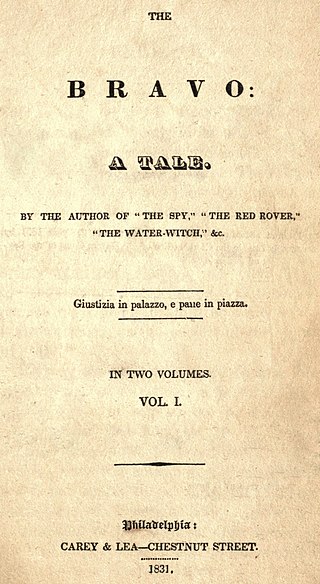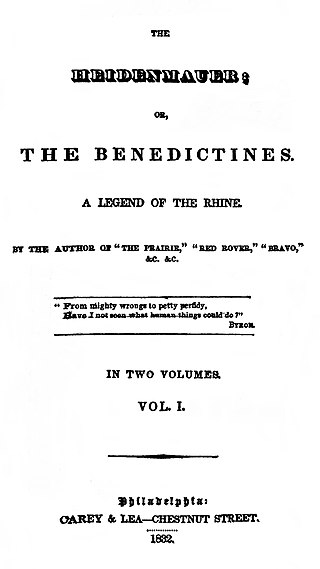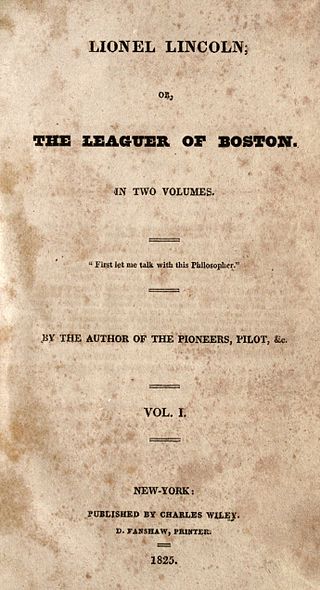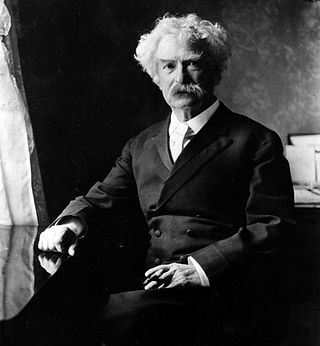Related Research Articles

James Fenimore Cooper was an American writer of the first half of the 19th century, whose historical romances depicting colonial and indigenous characters from the 17th to the 19th centuries brought him fame and fortune. He lived much of his boyhood and his last fifteen years in Cooperstown, New York, which was founded by his father William Cooper on property that he owned. Cooper became a member of the Episcopal Church shortly before his death and contributed generously to it. He attended Yale University for three years, where he was a member of the Linonian Society.

Chingachgook is a fictional character in four of James Fenimore Cooper's five Leatherstocking Tales, including his 1826 novel The Last of the Mohicans. Chingachgook was a lone Mohican chief and companion of the series' hero, Natty Bumppo. In The Deerslayer, Chingachgook married Wah-ta-Wah, who had a son with him named Uncas, but died while she was still young. Uncas, who was at his birth "last of the Mohicans", grew to manhood but was killed in a battle with the Huron warrior Magua. Chingachgook died as an old man in the novel The Pioneers, which makes him the actual "last of the Mohicans," having outlived his son.

The Monsters of Templeton is a dramatic novel written by Lauren Groff. Groff was born and raised in Cooperstown, New York. The name Templeton draws from the name devised for the town by James Fenimore Cooper, Cooperstown's most renowned author, known for The Leatherstocking Tales. Groff draws in many of the legends of Cooperstown, especially those crafted by Cooper himself, and ties them together over the expanses of time, then weaves them in with fictional modern-day events. The book was released to great critical acclaim.

Otsego Hall was a house in Cooperstown, New York, United States, built by William Cooper, founder of the town. Construction started in 1796 and was completed by 1799 in the Federal style. For many years, it was the manor house of Cooper's landed estate, and was one of the largest private residences in central New York. Cooper had moved his family to the settlement in 1790, and his son James Fenimore Cooper, who became an author, also lived in the house.

The Bravo is a novel by James Fenimore Cooper first published in 1831 in two volumes. Inspired by a trip to Europe where he traveled through much of Italy, the novel is set in Venice. The Bravo is the first of Cooper's three novels to be set in Europe. This group of three novels, which one critic would call Cooper's "European trilogy", include The Heidenmauer and The Headsman. Like his other novels set in Europe, The Bravo was not very well received in the United States. The book largely focuses on political themes, especially the tension between the social elite and other classes.
The Chainbearer; or The Littlepage Manuscripts is a novel by the American novelist James Fenimore Cooper first published in 1845. The Chainbearer is the second book in a trilogy starting with Satanstoe and ending with The Redskins. The novel focuses mainly on issues of land ownership and the displacement of American Indians as the United States moves Westward.

The Heidenmauer; or, The Benedictines – A Story of the Rhine is a novel by James Fenimore Cooper, first published in 1832. The novel is a socio-political novel set in 16th-century Germany that focuses on the competition between various socio-political classes and the tension caused by the Reformation. The Heidenmauer is Cooper's second novel in what one critic would call his European Trilogy, following The Bravo and preceding The Headsman. Like the other novels set in Europe, The Heidenmauer is intent on showing the darker side of European institutions in favor of an American perspective.

Lionel Lincoln is a historical novel by James Fenimore Cooper, first published in 1825. Set in the American Revolutionary War, the novel follows Lionel Lincoln, a Boston-born American of British noble descent who goes to England and returns a British soldier, and is forced to deal with the split loyalties in his family and friends to the American colonies and the British homeland. At the end of the novel, he returns to England with his wife Cecil, another American born cousin.

The Red Rover is a novel by American writer James Fenimore Cooper. It was originally published in Paris on November 27, 1827, before being published in London three days later on November 30. It was not published in the United States until January 9, 1828, in Philadelphia. In the same year, it was translated and published in Germany under the name Red Rover. Soon after its publication it was adapted for theater both in the United States and in England.

"Fenimore Cooper's Literary Offenses" is an essay by Mark Twain, written as a satire of literary criticism and as a critique of the writings of the novelist James Fenimore Cooper, that appeared in the July 1895 issue of North American Review. It draws on examples from The Deerslayer and The Pathfinder from Cooper's Leatherstocking Tales.
Afloat and Ashore is a nautical fiction novel by James Fenimore Cooper first published in 1844. Set in 1796–1804, the novel follows the maritime adventures of Miles Wallingford Jr., the son of wealthy New York landowners who chooses to go to sea after the death of his parents. The novel ends abruptly part way through, and is followed by what critic Harold D. Langely called a "necessary" sequel which resolves many thematic and plot elements. The novel is partially autobiographical, based in part on Cooper's own experiences as a sailor, and is his first full-length novel to fully employ a first-person narrative.

Mercedes of Castile; or, The Voyage to Cathay is an 1840 historical novel by James Fenimore Cooper. The novel is set in 15th-century Europe, and follows the preparations and expedition of Christopher Columbus westward to the new world.
The Monikins is an 1835 novel, written by James Fenimore Cooper. The novel, a beast fable, was written between his composition of two of his more famous novels from the Leatherstocking Tales, The Prairie and The Pathfinder. The critic Christina Starobin compares the novel's plot to Jonathan Swift's Gulliver's Travels. The novel is a satire, narrated by the main character, the English Sir John Goldencalf. Goldencalf and the American captain Noah Poke travel on a series of humorous adventures to an Antarctic archipelago inhabited by a race of civilized monkeys.

The Water-Witch is an 1830 novel by James Fenimore Cooper. Set in 17th-century New York and the surrounding sea, the novel depicts the abduction of a woman, Alida de Barbérie, by the pirate captain of the brigantine Water-Witch, and the subsequent pursuit of that elusive ship by her suitor, Captain Ludlow.
The Two Admirals is an 1842 nautical fiction novel by American author James Fenimore Cooper. The novel was written after the Leatherstocking Tales novel The Deerslayer. Set during the 18th century and exploring the British Royal Navy, Cooper wrote the novel out of encouragement of his English publisher, who recommended writing another sea novel. Cooper had originally intended to write a novel where ships were the main characters, though eventually decided not to. The novel is one of three novels which Cooper would revise for editions following their first printing, the other two being The Pathfinder and Deerslayer.
Autobiography of a Pocket Handkerchief is a serial novel by James Fenimore Cooper first published by Graham's Magazine in 1843. The novel explores the upper crust of New York Society from the perspective of a woman's handkerchief.
Wyandotté is a historical novel published by James Fenimore Cooper in 1843. The novel is set in New York state during the American Revolution. The main character of the novel is an Indian, "Saucy Nick", also called Wyandotté, whose depictions violate stereotypes of Native Americans.

The Oak Openings; or, The Bee Hunter is an 1848 novel by James Fenimore Cooper. The novel focuses on the activities of professional honey-hunter Benjamin Boden, nicknamed "Ben Buzz". The novel is set in Kalamazoo, Michigan's Oak Opening, a wooded prairie that still exists in part today, during the War of 1812.
Notions of the Americas; Picked Up by a Travelling Bachelor is an 1828 semi-nonfictional travel narrative by James Fenimore Cooper. The work takes the form of letters between a fictional bachelor traveling in the United States to his European friends. Cooper wrote the work while in Europe, and originally published the work anonymously, to conceal his identity and be more convincing to European audiences. The book persuasively argues for the virtue of American values and democracy in comparison to the aristocratic values of Europe.
The Headsman: The Abbaye des Vignerons is an 1833 novel by James Fenimore Cooper set in Switzerland. The novel was inspired by one of Cooper's trips during his European travels in 1832. The novel is one of three of Cooper's "European" novels, following The Bravo and The Heidenmauer, all of which use the European setting to deal with socio-political contrast with American institutions.
References
- ↑ Cooper, Susan Fenimore (1861). "Satamstoe (1845)". Pages and Pictures from the Writings of James Fenimore Cooper. W.A. Townsend and Co. – via James Fenimore Cooper Society.